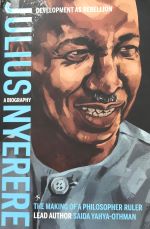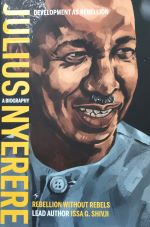Development as rebellion: a biography of Julius Nyerere
Julius Kambarage Nyerere (1922-1999), Tanzania’s first and longest-serving president, was an influential African statesman with an outspoken vision of the development of his nation, and Africa as a whole. This month’s ASCL Library Highlight features the most comprehensive biography of his life and politics to date, Development as rebellion: a biography of Julius Nyerere, by Saida Yahya-Othman, Ng’wanza Kamata, and Issa G. Shivji.
Development as rebellion: a biography of Julius Nyerere
This 1000+-paged biography consists of three volumes, each focusing on a different aspect of Nyerere’s life and politics. Each volume has a lead author with his or her own personal style and approach. Part One, with Saida Yahya-Othman as its lead author, is entitled The making of a philosopher ruler, and focuses on Nyerere’s youth, education, and private life. Part Two, Becoming nationalist, lead author Ng’wanza Kamata, deals with the struggle for independence and Nyerere’s efforts in nation-building. Part Three, Rebellion without rebels, lead author Issa G. Shivji, concentrates on Nyerere’s version of socialism. The volumes are thus divided thematically, rather than chronologically. The biography is based on a variety of sources, including primary materials from public and personal archives, and interviews with Nyerere’s contemporaries. Each volume also includes a photographic section.
Nyerere the thinker
The first part of the biography describes Nyerere’s childhood in the rural village of Butiama, where he grew up as one of the many children of a Zanaki chief. Due to his achievements in school, he was admitted to the elite Tabora Government School, and then continued to study to be a teacher, at Makerere University in Uganda, where he was baptized as a Catholic. After teaching for a few years at Tabora, he got the opportunity to continue his academic career in Britain, where he studied at the University of Edinburgh. The author tries to connect Nyerere’s younger years and early writings to his formation as a philosopher and his political ideas. She then describes his marriage to Mama Maria, and the influence of family and friends on his later thinking. Special attention is paid to the influence of women on Nyerere, in particular that of the British woman Joan Wicken, who remained Nyerere’s personal assistant and advisor for his entire political career. In the following chapters the author distinguishes Nyerere’s development as a writer and orator, and his love for the Swahili language. Finally, academic influences on Nyerere’s visions are discussed.
Related titles in the ASCL Library
- Nyerere : the early years / Molony, Thomas S.J. - Woodbridge: James Currey, 2014.
- Julius Nyerere : humanist, politician, thinker / Petruk, B.G., and Y.N. Vinokurov. Dar Es Salaam: Mkuki Na Nyota Publishers, 2005.
- All biographical works on Julius Nyerere
Nyerere the nationalist
Part two of the biography begins with the birth of the Tanganyika African National Union (TANU) in July 1954. TANU was the main political party in Tanganyika striving for independence from the British. Julius Nyerere was one of its founders. The author links the road to independence in Tanganyika with events in other African countries. There is also much attention for the development of Nyerere’s thoughts on nationalism, independence, and Pan-Africanism, also in relation to ideas of other African independence leaders. Nyerere’s approach was non-violent and non-racialist. The following quote gives some insight into Nyerere’s thoughts on nationalism and Pan-Africanism:
“[…] that the African national State is an instrument for the unification of Africa, and not for dividing Africa, that African nationalism is meaningless, is dangerous, is anachronistic if it is not at the same time pan-Africanism."
(World Assembly of Youth Forum, No. 40, 09 1961, p. 14)
This part of the biography ends with a section on the union between Tanganyika and Zanzibar in 1964.
Related titles in the ASCL Library
- Building a peaceful nation : Julius Nyerere and the establishment of sovereignty in Tanzania, 1960-1964 / Bjerk, Paul. - Rochester Studies in African History and the Diaspora ; v. 63. Rochester, NY: University of Rochester Press, 2015.
- Nyerere and Nkrumah : shared vision / Lupalo, Lawrence E.K. - Scotts Valley: CreateSpace, 2016.
- All titles on TANU
Nyerere the socialist
Part three of the biography distinguishes Nyerere’s vision of socialism. His ideas were reflected in his concept of Ujamaa (familyhood). As explained by Nyerere in Ujamaa: The basis of socialism (1962):
“Ujamaa, then, or ‘familyhood’, describes our socialism. It is opposed to capitalism, which seeks to build a happy society on the basis of the exploitation of man by man; and it is equally opposed to doctrinaire socialism which seeks to build its happy society on a philosophy of inevitable conflict between man and man. We, in Africa, have no more need of being ‘converted’ to socialism than we have of being ‘taught’ democracy. Both are rooted in our past - in the traditional society which produced us. Modern African socialism can draw from its traditional heritage the recognition as ‘society’ as an extension of the basic family unit. But it can no longer confine the idea of the social family within the limits of the tribe, nor, indeed, of the nation. For no true African socialist can look at a line drawn on a map and say “The people on this side of that line are my brothers, but those who happen to live on the other side of it can have no claim on me”. Every individual on this continent is his brother.[…] But we should not stop there. Our recognition of the family to which we all belong must be extended yet further- beyond the tribe, the community, the nation, or even the continent- to embrace the whole society of mankind. This is the only logical conclusion for true socialism.”
Important elements of Nyerere’s socialist vision for Tanzania included peasant farming, villagization, nationalization, democracy within a one-party system, self-reliance, mass education, and the use of the Swahili language. The practical consequences of Ujamaa were set out in the Arusha Declaration, the plan for national development as stated by TANU in 1967. The author details the elements of the Arusha Declaration and then describes Nyerere’s efforts for implementing this policy. The second half of the volume describes the outcomes of Nyerere’s policies, the conflict between Tanzania and Uganda in the late seventies, and the downfall of Nyerere’s regime.
Related titles in the ASCL Library
- Ujamaa: the basis of socialism / Nyerere, Julius K. In: Ujamaa : Essays on Socialism - Dar Es Salaam [etc.]: Oxford University Press, 1968.
- The Arusha Declaration and TANU's policy on socialism and self-reliance / Tanganyika African National Union. - Dar Es Salaam ; Dodoma: Publicity Section, Tanu, 1967.
- All titles on Ujamaa
- All titles on the Arusha Declaration
Nyerere: Memory and legacy
The legacy of Julius Nyerere is twofold. On the one hand, he is much admired for his vision and achievements as an African independence leader, often referred to as Baba wa Taifa (Father of the Nation), or Mwalimu (teacher). On the other hand, he is criticized for his limited democratic values and the failure of his policies. Nyerere himself remained an optimist throughout his life, as reflected in a quote included in the Preface of this biography:
“The progress of mankind ebbs and flows like the tides, but we are further forward in decency and civilization than when Homo Sapiens first emerged, despite all the horrors at any one time - including the present. As individuals, as family and friendship units, and as companions in the pursuit of ideas and ideals which have been built upon the struggles of others, we are victims. But it seems to me that eventually there will truly be One World. The underlying movement is in that direction.”
Related titles in the ASCL Library
- Julius K. Nyerere : servant of God or untarnished tyrant? / Mwijage, Ludovick S. - [ 2nd. Ed.] ed. Ambala: Wisdom House Publications, 2010.
- The servant of God : J.K. Nyerere : appropriate way to honour him = Mtumishi Wa Mungu / Nyerere, Anna J., and Felician V. M. Nkwera. - 2nd ed. Dar Es Salaam: Marian Faith Healing Centre, 2009.
- Life under Nyerere / Mwakikagile, Godfrey. - Pretoria: New Africa Press, 2006.
More titles in the ASCL Library
Online resources
- Portrait de Julius Nyerere / Foka, Alain. - Archives d'Afrique.
[Paris]: Radio France Internationale, 2015. Part 1-2 / Part 3-4 - African Roots: Julius Nyerere: Undeterred African leader. - DW (2018)
- Julius Nyerere Interview / by Saeed Naqvi. (2018)
- Faces of Africa: Julius Nyerere. - CGTN (2019)
Germa Seuren

